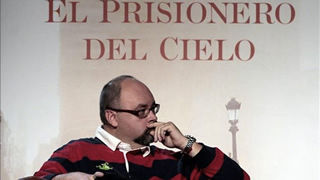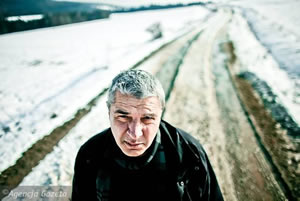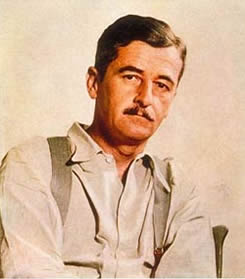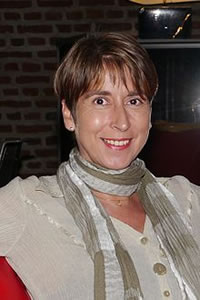De Spaanse schrijver Carlos Ruiz Zafón werd geboren op 25 september 1964 in Barcelona. Zie ook mijn blog van 25 september 2010 en eveneens alle tags voor Carlos Ruiz Zafón op dit blog.
Uit: The Prisoner Of Heaven (Vertaald door Lucia Graves)
“That year at Christmas time, every morning dawned laced with frost under leaden skies. A bluish hue tinged the city and people walked by, wrapped up to their ears and drawing lines of vapour with their breath in the cold air. Very few stopped to gaze at the shop window of Sempere & Sons; fewer still ventured inside to ask for that lost book that had been waiting for them all their lives and whose sale, poetic fancies aside, would have contributed to shoring up the bookshop’s ailing finances.
‘I think today will be the day. Today our luck will change,’ I proclaimed on the wings of the first coffee of the day, pure optimism in a liquid state.
My father, who had been battling with the ledger since eight o’clock that morning, twiddling his pencil and rubber, looked up from the counter and eyed the procession of elusive clients disappearing down the street.
‘May heaven hear you, Daniel, because at this rate, if we don’t make up our losses over the Christmas season, we won’t even be able to pay the electricity bill in January. We’re going to have to do something.’
‘Fermín had an idea yesterday,’ I offered. ‘He thinks it’s a briljant plan that’ll save the bookshop from imminent bankruptcy.’
‘Lord help us.’
I quoted Fermín, word for word:
‘Perhaps if by chance I was seen arranging the shop window in my underpants, some lady in need of strong literary emotions would be drawn in and inspired to part with a bit of hard cash. According to expert opinion, the future of literature depends on women and as God is my witness the female is yet to be born who can resist the primal allure of this stupendous physique,’ I recited.
I heard my father’s pencil fall to the floor behind me and I turned round.
‘So saith Fermín,’ I added.”

Carlos Ruiz Zafón (Barcelona, 25 september 1964)
De Poolse schrijver en letterkundige Andrzej Stasiuk werd geboren op 25 september 1960 in Warschau. Zie ook mijn blog van 25 september 2010 en eveneens alle tags voor Andrzei Stasiuk op dit blog.
Uit: Nine (Vertaald door Bill Johnston)
„Snow had fallen in the night.
Pawel got out of bed and went into the bathroom. The light was on, the mirror was broken. Tubes and brushes and bottles had been swept off the shelf, were all over the floor. A stream of white toothpaste had shot out and dried on the willow-green wall. Disposable razors had been snapped in two and stepped on into a torn box of soap powder. The cracked toilet seat lay in the corner. It occurred to him there was a lot of glass, so he went back to the hallway for his shoes.
He picked up one of the toothbrushes, rinsed it under the faucet, scraped some toothpaste off the wall. Then he squatted and chose a razor with a cracked handle. He found the can of shaving cream under the bathtub. It was dented but something still swished inside it. He shaved in what was left of the mirror. He splashed water on his face. The Old Spice had been crushed, but there was still something left in the white plastic cover. He shook the crumpled container. It made a grating sound like a deaf-and-dumb version of a childs rattle. A few drops splashed onto his palm. He rubbed them on his cheeks. It hardly stung, so this time he must have managed not to cut himself. He took a leak and went back into the living room.
Things were no better here. More smashed stuff. The cracked silver casing of the cassette player emptied its colorful guts onto the floor. He flicked the light switch. The lamp was in pieces. The light of early morning hung like dust in the air. Something white poked from the ripped upholstery of the sofa. He smoothed it with his hand and went to the pile of clothes spilling out of the wardrobe. He sniffed a few things to find something clean in the semidarkness. He put on a shirt and sweater. By the bed he found his pants; he dug out some socks from an untouched drawer and pulled them on, and at last stopped shivering.
He sipped at his coffee and gazed through the window. Snow lay on the roofs and on the sidewalk; the black trees were white now, and everything resembled a distant Christmas. A red bus cautiously made a turn. Sleepily and soundlessly it straightened, receded down the avenue of lime trees. The treetops faded into the low sky. He listened for the patter of drops in the gutters. There was no sound. “Itll lie for a while,” he thought.”

Andrzej Stasiuk (Warschau, 25 september 1960)
De Amerikaanse schrijver William Faulkner werd geboren op 25 september 1897 in New Albany, Mississippi. Zie ook mijn blog van 25 september 2010 en eveneens alle tags voor William Faulkner op dit blog.
Uit: A Fable
“Wednesday
Long before the first bugles sounded from the barracks within the city and the cantonments surrounding it, most of the city was already awake. These did not need to rise from the straw mattresses and thin pallet beds of their hive-dense tenements, because few of them save the children had ever lain down. Instead, they had huddled all night in one vast tongueless brotherhood of dread and anxiety, about the thin fires of braziers and meagre hearths, until the night wore at last away and a new day of anxiety and dread had begun.
Because the original regiment had been raised in this district, raised in person, in fact, by one of the glorious blackguards who later became Napoleon’s marshals, who delivered the regiment into the Emperor’s own hand, and along with it became one of the fiercest stars in that constellation which filled half the sky with its portent and blasted half the earth with its lightning. And most of its subsequent replacements had been drawn from this same district, so that most of these old men were not only veterans of it in their time, and these male children already dedicated to it when their time should come, but all these people were parents and kin, not only the actual old parents and kin of the doomed men, but fathers and mothers and sisters and wives and sweethearts whose sons and brothers and husbands and fathers and lovers might have been among the doomed men except for sheer blind chance and luck.
Even before the bugles’ echoes died away, the warrened purlieus were already disgorging them. A French or British or American aviator (or a German either for that matter, if he had had the temerity and the luck) could have watched it best: hovel and tenement voiding into lane and alley and nameless cul-de-sac, and lane and alley and cul-de-sac compounding into streets as the trickles became streams and the streams became rivers, until the whole city seemed to be pouring down the broad boulevards converging like wheelspokes into the Place de Ville, filling the Place and then, pressed on by the weight of its own converging mass, flowing like an unrecoiling wave up to the blank gates of the Hôtel where the three sentries of the three co-embattled nations flanked the three empty flagstaffs awaiting the three concordant flags”.

William Faulkner (25 september 1897 – 6 juli 1962)
De Duitse schrijfster Rebecca Gablé (pseudoniem van Ingrid Krane-Müschen) werd geboren op 25 september 1964 in Wickrath / Mönchengladbach. Zie ook mijn blog van 25 september 2010 en eveneens alle tags voor Rebecca Gablé op dit blog.
Uit: Von Ratlosen und Löwenherzen
“Am 28. Juni 1461 wurde Edward of March mit nicht einmal zwanzig Jahren zu Edward IV. von England gekrönt – der erste König aus dem Hause York. Die meisten Engländer waren erleichtert. Den einfachen Leuten war nämlich völlig egal, wie ihr König mit Nachnamen hieß. Sie wollten nur, dass nach 116 Jahren Krieg gegen Frankreich und den sich nahtlos anschließenden sechs Jahren Bürgerkrieg endlich mal Ruhe herrschte und niemand in ihre Dörfer kam, um ihre Scheunen zur Versorgung der Truppen zu plündern oder ihre Väter, Ehemänner und Söhne als Bogenschützen anzuwerben, die dann entweder gar nicht oder mit einem Arm, Bein oder Auge weniger nach Hause kamen. Und König Edward machte seine Sache hervorragend. Nach dem jämmerlichen Henry VI. (den seine Königin mitsamt ihrem Sohn in Schottland in Sicherheit gebracht hatte), war es doch irgendwie sehr beruhigend, einen König auf dem Thron zu haben, der auch wie ein König aussah, redete und handelte.
Edward IV. hatte in vieler Hinsicht Ähnlichkeit mit seinen strahlenden Vorgängern Edward III. und Henry V. Genau wie sie legte er keinen Wert auf Rachefeldzüge gegen die besiegten politischen Gegner, sondern setzte auf Aussöhnung. Genau wie sie war er ein König, dem Recht und Rechtsprechung sehr am Herzen lagen, der aber auf dem Schlachtfeld ordentlich hinlangen konnte, wenn es sein musste. Und genau wie sie sah er – so wird berichtet – unverschämt gut aus und ließ nichts, aber auch gar nichts anbrennen. Und genau das wurde sein größtes Problem. Während sein wichtigster Ratgeber, sein Cousin Richard Earl of Warwick, ihn zu einer Ehe mit einer französischen Prinzessin drängte, der kaum weniger einflussreiche Earl of Pembroke auf eine Verbindung mit Burgund setzte, hatte der König sich rettungslos in die Witwe eines unbedeutenden Landritters verliebt, Elizabeth Woodville.”

Rebecca Gablé (Wickrath, 25 september 1964)
Zie voor nog meer schrijvers van de 25e september ook nog mijn blog van 25 september 2011 deel 2 en eveneens deel 3.
